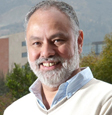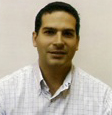Three Representatives of the LACNIC Community
Three Representatives of the LACNIC Community
Rafael (Lito) Ibarra

Born in El Salvador, Rafael "Lito" Ibarra holds degrees in Electrical Engineering and Business Administration, as well as a master's degree in ICT.
He is founding president and CEO of SVNet (the Salvadorian ccTLD), president and founder of RAICES (the Salvadorian Advanced Research, Science, and Education Network) and member of the LACNIC Board of Directors. Prior to this, he was the first person to chair the LACTLD Board and served on the RedCLARA Board.
One of the founding members of Asociación Conexión al Desarrollo de El Salvador, Infocentros, and the Fab Lab El Salvador, Rafael has been a member of his country's National Council of Science and Technology, CIO at Universidad Centroamericana Jose Simeon Cañas and president of the ISOC El Salvador Chapter. He serves on the boards of several private and public companies, was formerly a university professor, and has directed many undergraduate and graduate theses. Rafael has been recognized as the Father of the Salvadorian Internet, and has collaborated on various projects and initiatives relating to the Knowledge Society in both Central and Latin America.
Esteban Lescano

Esteban obtained his MBA in 2010. He graduated summa cum laude from the IAE Business School at Universidad Austral and holds a master's degree in Business Law which he obtained from Universidad Francisco de Vitoria (Madrid, Spain, 2003) through a scholarship granted by Fundación Carolina. He completed his postgraduate studies in Telecommunications Law at Universidad Austral (Buenos Aires, 2000), where he received his law degree in 2000, with honors.
From March, 2007 to date: Partner at LESCANO & ETCHEVERRY ABOGADOS (www.lescano etcheverry.com.ar), a law firm that specializes in providing legal and strategic counsel to telecommunications service providers as well as information technology and social media companies. His clients include local and multinational companies, cooperatives, public agencies, and non-profit organizations involved in telecommunications and audiovisual communications services in Argentina and several other Latin American countries.
He represents his clients before various business chambers and regulators, including the Ministry of Communications, the National Communications Commission, the Federal Authority on Audiovisual Communication Services, and the National Commission for the Protection of Competition. He leads the Argentine Internet Chamber's Commission on Legal and Public Policy Matters and represents this Chamber (CABASE) before the Argentine Universal Service's Technical Committee, the organization that advices the Ministry of Communications on the execution of Universal Service programs aimed at developing telecommunications within the country.
Since 2002, he is professor of The Right to Information at the School of Social Studies of Universidad de Buenos Aires (UBA), where his research focuses on IP network interconnection and online freedom of expression. He has also taught other subjects relating to telecommunications and information technology law at Universidad Austral and Universidad de Ciencias Empresariales y Sociales, both in the city of Buenos Aires.
He has actively participated in LACNIC and ICANN meetings since 2013 and has attended NETMUNDIAL, as well as other regional and international Internet Governance related forums and events.
He has presented at seminars and workshops on the ICT and Telecommunications industry. He has published research papers and articles on telecommunications regulation in newspapers and magazines.
Jorge Villa

Jorge Villa holds a Master's degree in Telematics and a degree in Telecommunications Engineering from Instituto Superior Politecnico Jose Antonio Echeverria (Havana, Cuba).
He has worked in Cuban telecommunication companies since 1993 and, for the past 17 years, he has worked in academia, within the Networks and Telecommunications Department of the Ministry of Higher Education, and as Telecommunications Supervisor of the National University Network, where he is responsible for the design and operation of the network's communications infrastructure.
Jorge has been involved in several major national and international projects, including bringing the Internet to Cuba (1996), redesigning the National University Network (Canary Islands, 1998), developing a Cuban project similar to Internet2 (2002), creating Red CLARA (2003), and mass Training in Internet Technologies and Knowledge Management (Autonomous University of Santo Domingo, Dominican Republic 2005-2007).
He founded the Cuban IPv6 Task Force (2003), has participated in multiple LACNIC meetings both as a speaker and a panelist within the Latin American and Caribbean IPv6 Forum (FLIP6), and is also a member of the FLIP6 Program Committee. He has also been a speaker at the Latin American Network Operators Forum (LACNOG) and is currently serving on the LACNOG Program Committee. In addition, he helped organize the LACNIC IPv6Tour (Havana 2005 and 2009), where he made several presentations on relevant topics. He is a member of the Coordinating Committee for the Global IPv6 Summit in Mexico, and has presented lectures and specialized workshops during all prior editions of the event (2007, 2009, 2011).
Jorge Villa currently represents the Latin American and Caribbean region on the ICANN Address Supporting Organization Address Council (ASO AC). He is a regular speaker at various conferences and events, provides consultancy services and teaches postgraduate courses on networks, telecommunications, and Internet technology, both in Cuba and abroad. He has worked with various organizations, including the Canary Institute of Research and Development, UNESCO, and UNDP.